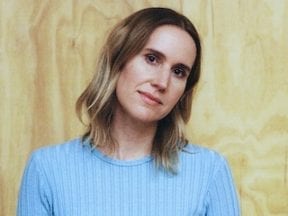It’s one thing to create a product that solves a problem for consumers, but it’s another to get them to buy it, especially when the seller has no marketing budget. Take Sarah Moret, for example. An accountant and athlete, she formulated an aluminum-free deodorant and then marketed it herself in a live demo, more or less.
She told me, “I would go on a 15-mile run and then, on Instagram, sniff my armpit. I’d say, ‘I still smell like White Tea,’ one of our scents.”
That was in late 2018. Fast forward to 2022, and Moret’s deodorant business is now Curie, a thriving direct-to-consumer seller of personal care and lifestyle goods.
She and I recently discussed her journey. The audio of our entire conversation is embedded below. The transcript is edited for clarity and length.
Eric Bandholz: Tell us about Curie.
Sarah Moret: I launched the company in late 2018. This is my first business. I knew nothing about ecommerce. I was a certified public accountant out of college, did that for two years, and hated it. But it provided a good accounting and finance foundation, important for a founder. Then I worked in venture capital for four years as an associate at an early-stage fund.
We started to dabble in the direct-to-consumer arena. I’ve always been passionate about brands and products. I was one of the only female investors in Los Angeles, so many clean beauty startups were pitching me in 2016, 2017.
That’s how I became interested in this space. I started Curie as a personal need. I’m an athlete, a marathoner. I couldn’t find an aluminum-free deodorant that worked. So I made my own. I hired a chemist who helped formulate my version of that type of deodorant. It took off from there.
The last couple of years has been like a free MBA. I’ve learned from googling and talking to other founders.
I built the brand for a group of consumers that weren’t having their needs met. A lot of people felt like aluminum-free deodorant didn’t work. I tried to convince them otherwise. I was ubiquitous on email and social media in that first year. I would go on a 15-mile run and then, on Instagram, sniff my armpit. I’d say, “I still smell like White Tea,” one of our scents.
Bandholz: You’re the third deodorant company on this podcast. I’ve had Jaime Schmidt of Schmidt’s Naturals and Moiz Ali of Native Deodorant. It’s a competitive market.
Moret: For sure. I launched Curie with $12,000 of savings and zero marketing budget. We started with one product, our aluminum-free stick deodorant. It was a bootstrap side hustle for that first year. But I scaled up to six figures in revenue based on organic customer acquisition — word of mouth, influencers, and press.
That generated 1,000 raving customers who were a launchpad for us.
At that point, deodorant was becoming more and more competitive, as you mentioned. But I had loyal customers who loved the brand. Our repeat purchase rate was high. I started to think about where I could take the business beyond deodorant to continue the growth and momentum.
In talking to our customers, I learned they loved our signature scents. They wanted our scents on their whole body. If you’re an Orange Neroli girl, you wanted Orange Neroli everywhere. If you’re a White Tea guy, you wanted to use it not just on your underarms.
So we started to think long-term about the business as kind of a Bath & Body Works for the next generation. And that’s what we’ve done in the last two years for product development.
We launched our Full Body Deodorant Spray, our Whipped Body Wash, and a body oil. We have candles. We’re about to collaborate with a big scent diffuser company. We’re positioning ourselves as a clean scent provider that makes personal care products and home fragrances.
We’ve seen the response from our customers. They’re not just buying deodorant. I don’t think our customers think of us as solely a deodorant company anymore. Hopefully that will continue as we evolve the business into a lifestyle brand focused on clean signature scents.
Bandholz: You were on Shark Tank last month.
Moret: Yes. It aired on March 11. It was a long process. I first applied to be on the show in 2020 and was finally accepted this year.
I prepared for Shark Tank like crazy. I talked to everyone I could find that had been on the show, such as you from your appearance in 2014. I bought tons of inventory.
We re-did our website. Our old site was a basic Shopify theme that I created years ago. We didn’t have any upsell capabilities, our home page wasn’t shoppable, and there were too many clicks in the checkout. We optimized for conversions and launched the new site five days before Shark Tank aired, which I don’t recommend. If you have a big surge in traffic coming up, give yourself more space.
It was my first time being on national television. The response has been unbelievable. We ended up getting a deal with Mark Cuban and Barbara Corcoran. Despite buying the extra inventory, we sold out of our products. We had double the sales volume in the six hours after the Shark Tank show than our entire first year. We have a 5,000-person waitlist now for our deodorant.
Bandholz: Selling out of product — that’s the problem to have.
Moret: Yes and no. When you sell out, people congratulate you. But as founder, I’m like, “Oh no, we’re sold out. What are we going to do about our subscribers, our retailers?” All of our retailers sold out. They want more. We don’t have the products to send them. So we’re hustling to get back in stock to capture some of that demand from the show.
Bandholz: I love the Kaftan font on your new site.
Moret: Yes, that’s new. I love it, too. We went back and forth on it. Our motto is “humans in motion.” The Kaftan font has a lot of movement to it. We worried that it was too girly, however. Ultimately, we decided that our male customers won’t be turned off by a font that looks girly.
We design our site in-house. We bought an Archetype theme called “Streamline” and then customized it. We didn’t hire an agency, which probably saved a lot of money. I downloaded the theme one afternoon and started to build the site using it. I was able to get 80% done myself. Our designer made some tweaks and aesthetic customizations.
Bandholz: How can people support you, reach out?
Moret: Our site is Curiebod.com. We are also on Instagram and TikTok. I’m on Twitter a lot.




